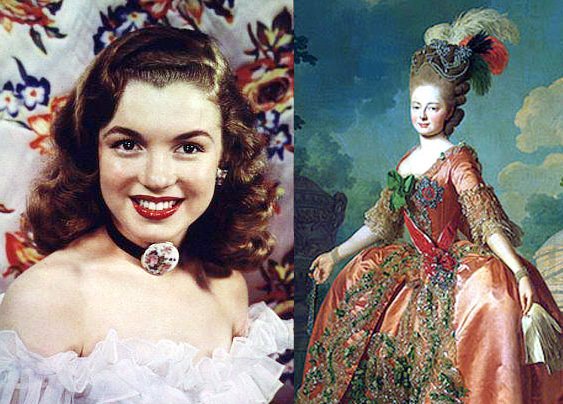I happened upon a picture of Lee Harvey Oswald and thought it was time to get to the bottom of things.
Comparing photos of Joseph "Joe" Patrick Kennedy, Sr.(JFK's father) and Oswald I was struck by the similarity of facial features. Perhaps indicating some family connection in a recent past life or many past lives.
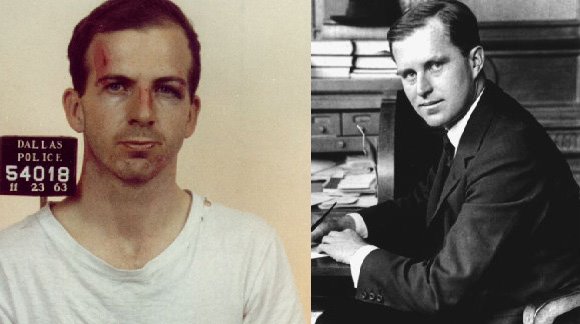
Oswald had obvious connections to Russia - he defected to the Soviet Union in October 1959 and married a Russian woman. It was logical then to look for the Kennedy family in Russia.
According to the Akashic Records, Joseph "Joe" Patrick Kennedy, Sr. (JFK's father) was the reincarnation of Nicholas I of Russia.
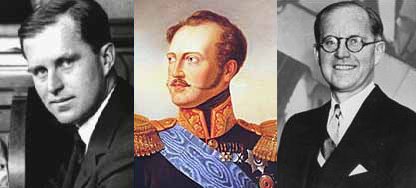
Princess Charlotte of Prussia
Rose Fitzgerald Kennedy (JFK's mother) was the reincarnation of Princess Charlotte of Prussia (Nicholas I's wife).

Alexander II
Lee Harvey Oswald was the reincarnation of Alexander II, who was born the eldest son of Nicholas I of Russia and Charlotte of Prussia.
Alexander gave evidence of a kind disposition and a tender-heartedness which were considered out of place in one destined to become a military autocrat. Alexander succeeded to the throne upon the death of his father in 1855.
Alexander showed that, unlike his father, he meant to grapple boldly with the difficult and dangerous problem of serfdom. His deliberations at once raised a host of important, thorny questions. The emancipation was not merely a humanitarian question capable of being solved instantaneously by imperial decree. It contained very complicated problems, deeply affecting the economic, social and political future of the nation.
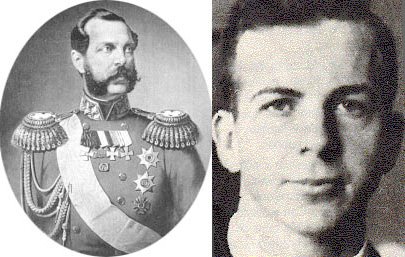
Marie Alexandrovna
Do you believe in the possibility of reincarnation? Oswald's Russian wife, Marina Prusakova is the reincarnation of Alexander II's wife - Princess Maximilienne Wilhelmine Marie of Hesse and the Rhine (also known as Marie Alexandrovna. The Mariinsky Theatre in Saint Petersburg is named after her).
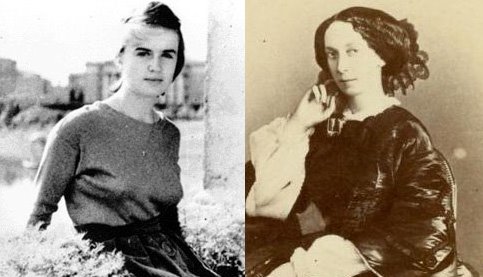
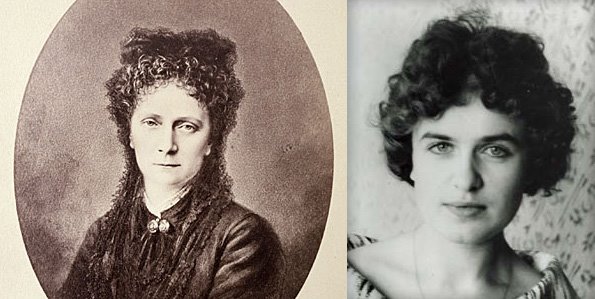
The Assassination of Alexander II
There were numerous assassination attempts on Alexander II's life.
In March 1881 Alexander II fell victim to a Nihilist plot. While driving on one of the central streets of St. Petersburg, near the Winter Palace, he was mortally wounded by the explosion of hand-made grenades and died a few hours afterwards.
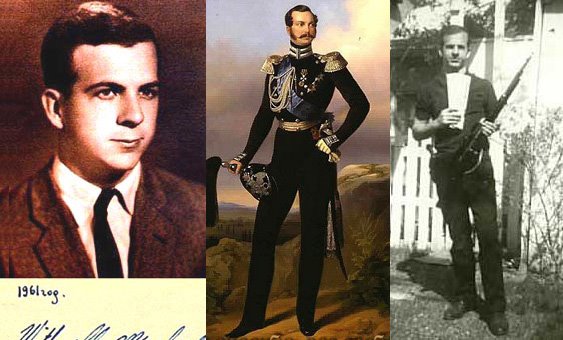
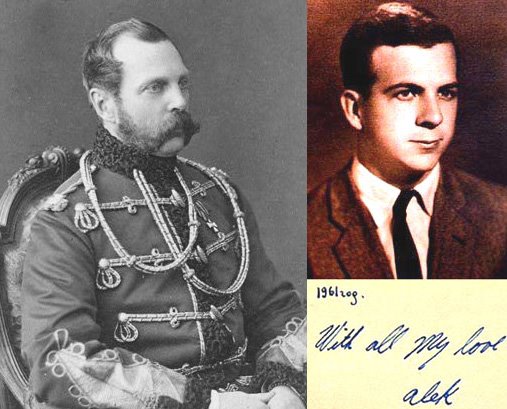
The Tsar was killed by the Pole Ignacy Hryniewiecki. Hryniewiecki was a Pole from Lithuania (Bobrujsk, now Babruysk, Belarus), where suppression and persecution of the Poles were the harshest. The Russians had instigated a complete ban on the Polish language in public places, schools, and offices in a process now known as Russification. In 1875 Hryniewiecki left for Saint Petersburg, where he joined the faculty of mathematics at the local Institute of Technology. Under influence from his teachers and colleagues he quickly got russified. Most probably this was the reason why he was invited to the meetings of Russian revolutionary Narodnaya Volya (People's Will) movement, unlike many of his colleagues of non-Russian descent.
In 1880, Hryniewiecki, Andrei Zhelyabov, Sophia Perovskaya and others were in charge of revolutionary propaganda among students and workers. He was one of the organizers of the "Worker's Gazette" and a type-setter for a clandestine printing-house.
On March 13, 1881 (Julian date: March 1), Hryniewiecki threw a bomb at the Tsar Alexander II, who was passing through Nevsky Prospekt near the Winter Palace. The Tsar was fatally wounded in the explosion and died a few hours afterwards. Hryniewiecki was mortally wounded at the scene as well. The attack may well have been a suicide bombing.
The assassination was aimed at igniting a social revolution. Its members - Nikolai Kibalchich, Sophia Perovskaya, Nikolai Rysakov, Timofei Mikhailov, Andrei Zhelyabov - were arrested and sentenced to death. Gesya Gelfman was sent to Siberia.

Who was Ignacy Hryniewiecki?
Ignacy Hryniewiecki reincarnated as JFK!
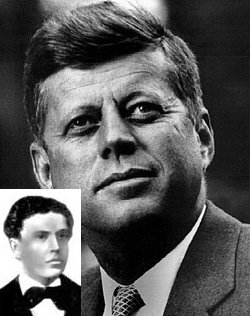
Alexander III of Russia
Alexander III reigned as Emperor of Russia from March 14, 1881 until his death in 1894.
Alexander was born at St. Petersburg, the second son of Tsar Alexander II by his wife Marie of Hesse-Darmstadt. In disposition, he bore little resemblance to his soft-hearted, liberal father.
During the first twenty years of his life, Alexander had little prospect of succeeding to the throne, because he had an elder brother, Nicholas, who seemed of robust constitution. Even when this elder brother first showed symptoms of delicate health, the notion that he might die young was never seriously entertained; Nicholas was betrothed to the charming princess Dagmar of Denmark. Under these circumstances, the greatest solicitude was devoted to the education of Nicholas as tsarevich, whereas Alexander received only the perfunctory and inadequate training of an ordinary grand-duke of that period, which did not go much beyond secondary instruction, practical acquaintance with French, English and German, and a certain amount of military drill.
Maria Feodorovna (Dagmar of Denmark)
Maria Feodorovna (Dagmar of Denmark) died in 1928, later reincarnated and became Jacqueline Kennedy Onassis.
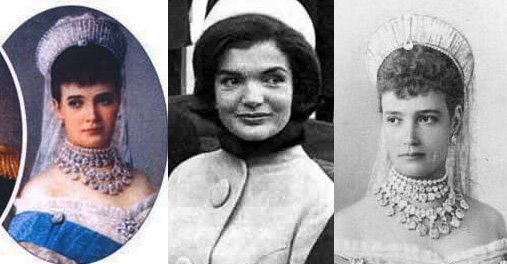
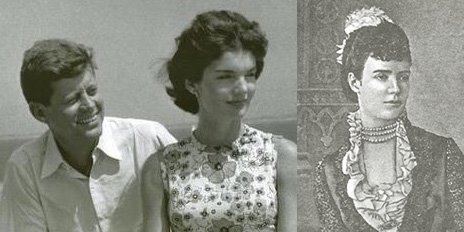
Jack Ruby
Sophia Lvovna Perovskaya was a revolutionary, member of Narodnaya Volya (the People's Will).
Daughter of a former military governor of St.Petersburg, Perovskaya entered the Alarchinsky University for Women in 1869. In 1871—1872, together with other three women friends, she joined the Circle of Tchaikovsky. In 1872—1873 and 1874—1877, she worked in the provinces of Samara, Tver, and Simbirsk. During this period, she received diplomas as a teacher and a medical assistant.
In 1873, Perovskaya maintained a few conspiracy apartments in Saint Petersburg for secret anti-tsarist propaganda meetings that had not been sanctioned by the authorities. In January of 1874, she was arrested and placed in the Petropavlovskaya fortress in connection with the Trial of 193. In 1877-1878, she was acquitted. Perovskaya also took part in an unsuccessful attempt to free a revolutionary and a member of Narodnaya Volya Ippolit Myshkin. In summer of 1878, Perovskaya became a member of Zemlya i volya, was soon arrested again, and banished to the Olonetskaya province. She managed to escape on her way to the exile and went underground.
As a member of Zemlya i volya, Perovskaya went to Kharkov in order to organize the liberation of political prisoners from the central prison. In the fall of 1879, she became a member of the Executive Committee and later a member of the Administrative Committee of Zemlya i volya. Perovskaya conducted propaganda among students, soldiers, and workers, took part in organizing the Worker's Gazette, maintained ties with political prisoners in Saint Petersburg. Perovskaya participated in preparing assassination attempts on Alexander II of Russia near Moscow (November, 1879), in Odessa (spring of 1880), and Saint Petersburg (March 1, 1881). She was the closest friend and later wife of Andrei Zhelyabov. Perovskaya was arrested on March 10, 1881 and sentenced to death by hanging along with a few other Pervomartovtsi.
Sophia Perovskaya was the first woman in Russia executed in connection with a political trial.
Sophia Perovskaya later reincarnated as Jack Rubyand assassinated the reincarntion of the man she had plotted to kill in her previous life!
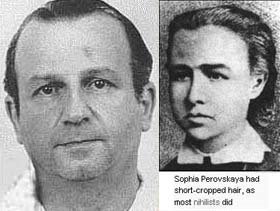
Assassination
Following Alexander II's death, Alexander III came to power. In 1887, once again Narodnaya Volya planned the murder of Tsar Alexander III. Among the conspirators captured were one Aleksandr Ulyanov. Ulyanov was sentenced to death and hanged on May 5, 1887. Alexander Ulyanov was the brother of Vladimir Ilyich Ulyanov, who would later take the pseudonym V.I. Lenin.
Sid Vicious
Alexander Ulyanov became John Simon Ritchie-Beverly, better known as Sid Vicious, who was an English punk rock musician and member of the band the Sex Pistols.
He died from a drug overdose at the age of 21.
Ulyanov and his comrades were preparing an assassination attempt on the life of Alexander III of Russia; however, on March 1, 1887 they were arrested. Ulyanov came forward with a political speech in court. On May 8, Alexander Ulyanov and his comrades Pakhomiy Andreyushkin, Vasili Generalov, Vasili Osipanov and Petr Shevyrev were sentenced to death and hanged.
The execution of his brother Alexander radicalized Lenin and he became more involved in student protests and revolutionary propaganda efforts.
Alexander Ulyanov's photo is on the left.

Edwin Walker
General
Edwin Walker was an outspoken anti-communist, segregationist and member
of the John Birch Society who had been commanding officer of the Army's
24th Infantry Division based in West Germany under NATO supreme command
until he was relieved of his command in 1961 by JFK for distributing
right-wing literature to his troops. Walker resigned from the service
and returned to his native Texas. He ran in the six-person Democratic
gubernatorial primary in 1962 but lost to John Connally, who went on to
win the race. When Walker came to Oswald's attention in February 1963
the general was making front page news with an evangelist partner in an
anti-Communist tour called Operation Midnight Ride.
Lee Harvey Oswald put Walker under surveillance, taking pictures of the general's home and nearby railroad tracks (with the same camera Marina later used to take the famous backyard poses). Oswald mail-ordered a rifle using his alias Alex Hidell, having already mail-ordered a revolver in January. He planned the assassination for April 10, ten days after he was fired from Jaggars-Chiles-Stovall. He chose a Wednesday evening since the neighborhood would be relatively crowded because of services in a church adjacent to Walker's home: He would not stand out and could mingle with the crowds if necessary to make his escape. He left a note in Russian for Marina with instructions for her to follow should he be caught. Walker was sitting at a desk in his dining room when Oswald fired at him from less than a hundred feet (30 m) away. Walker survived only because the bullet struck the wooden frame of the window which deflected its path, but was injured in the forearm by bullet fragments.
The Dallas police had no idea who attempted to kill Walker. Marina saw Oswald burn most of his written assassination plans in the bathtub, although she hid the note he left her in a thick Russian book of household advice, intending to bring it to the police should Oswald again try to kill Walker or anyone else. Oswald's involvement was unknown until the note and some of the photos were found by authorities following the assassination of JFK. The bullet was too badly damaged to run conclusive ballistics studies, though neutron activation tests later proved the bullet was from the same cartridge manufacturer as the two which later struck Kennedy.
Maybe we can find Edwin Walker in Russia?
Dmitry Karakozov
It seems Walker had been Dmitry Karakozov.
In 1866 there was an attempt on the life of Alexander II (a former incarnation of Lee Harvey Oswald) in Petersburg by Dmitry Karakozov.
Stemming from a Kostroma family of petty nobility, Dmitry Karakozov studied at Kazan University (since 1861) and Moscow State University (since 1864). In the early 1866, he became a member of the "revolutionary wing" of the Ishutin Society, founded by his cousin Nikolai Ishutin in Moscow in 1863. In the spring of 1866, Karakozov arrived in St.Petersburg to assassinate Alexander II. He circulated his hand-written proclamation called "Друзьям-рабочим" (To Friends the Workers), in which he incited people to revolt. On April 4, 1866, Dmitry Karakozov made an unsuccessful attempt at shooting the emperor at the gates of the Summer Garden in St.Petersburg.
The Supreme Criminal Court sentenced Karakozov to death by hanging. He was executed in St.Petersburg on September 3, 1866.
To commemorate his narrow escape from death (that he referred to only as "the event of April 4, 1866") Alexander II held a competition to design a great gate for the city. Architect, painter and costume designer Viktor Hartmann won the competition. The design was well-received and Hartmann thought it was his finest work, but it would never be built. The painting of the design later became Mussorgsky's inspiration for The Great Gate of Kiev from Pictures at an Exhibition.
In the photo comparison above, Dmitry Karakozov is on the right.
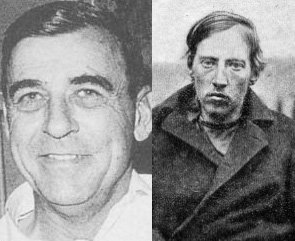
The Kennedy Curse: George Armstrong Custer
On April 16, 1841 Alexander II married Maria Alexandrovna. The marriage produced six sons and two daughters. One son was Alexei Alexandrovich.
His Royal Highness, The Grand Duke Alexis Alexandrovitch Romanov of the Royal Romanov Family of the Great Empire of Russia. This was his official title. In late 1871 he made a trip of good will to the United States and visited in 34 major American cities. He gave $5000 ($250,000 today) in gold to the homeless people of Chicago after the great fire and liberal sums to others in the slums of Boston and New York. He became our adopted prince, just like princess Diana. He also became very popular with the ladies, and they made complete fools of themselves wherever he went. On his 22nd birthday, 14 January 1872, he was hunting buffalo on the plains of southwest Nebraska with American celebrities of the day, like Lt. General Sheridan, second in command of the US Army. General Custer, who became a fast friend and they continued to correspond by letter until the Battle of the Little Bighorn. Buffalo Bill, who loaned His Royal Highness his horse and his rifle and assisted him in bringing down a big buffalo bull. Chief Spotted Tail of the Brule (pronounced Brue-lay) who with some of his braves showed the Grand Duke how the Indians killed buffalo without using guns and who later became head chief of all the Sioux when Red Cloud was arrested after the Litle Bighorn. They also killed many champagne bottles on this hunt. Alexis spoke of the hunt many times during the rest of his life.
What's the connection to Robert Kennedy?
Robert Kennedy appears in my story as Tsar Paul I of Russia (father of Nicholas I - see the beginning of my story) and George Armstrong Custer.

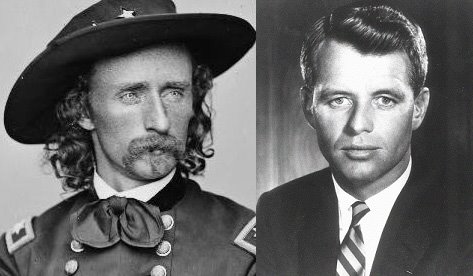
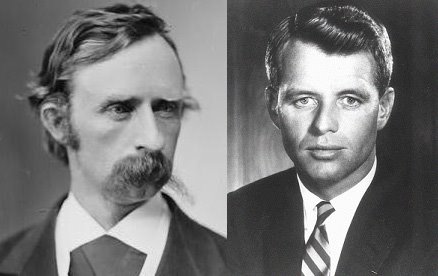
Paul was born in the Summer Palace at St Petersburg. He was the son of the Grand Duchess, afterwards Empress, Catherine (The Great). According to some, his father was not her husband, the Grand Duke Peter, afterwards emperor, but Catherine's lover Sergei Saltykov. Although Catherine herself hinted that the story was true, it is fairly likely that this was simply an attempt to cast doubt on Paul's right to the throne, in order to prop up Catherine's own somewhat shaky claim. During his infancy Paul was taken from the care of his mother by the Empress Elizabeth, whose ill-judged fondness allegedly injured his health. As a boy he was reported to be intelligent and good-looking. His pugnacious facial features in later life are attributed to an attack of typhus, from which he suffered in 1771. It has been asserted that his mother hated him, and was only restrained from putting him to death while he was still a boy by the fear of what the consequences of another palace crime might be to herself. Her dissolute court provided a bad home for a boy destined to become the sovereign, but Catherine took great trouble to arrange his first marriage with Wilhelmina of Hesse-Darmstadt (who acquired the Russian name "Natalia Alexeievna") in 1773. After his first marriage Tsar Paul I became involved in intrigues. He believed he was the target of assassination. When his wife died in childbirth in 1775, his mother arranged another marriage on October 7, 1776, with the beautiful Sophia Dorothea of Württemberg, renamed in Russian "Maria Feodorovna".
Maria bore Paul 10 children. Tsar Paul grew to hate her.
Sophia Dorothea of Württemberg later became Marilyn Monroe.
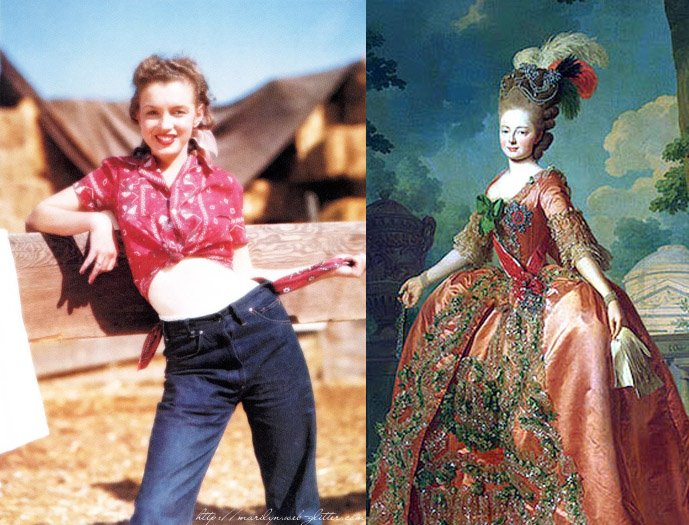
Robert Kennedy
Why was Robert Kennedy assassinated?
Was it connected to events in Russia, the Battle of the Little Bighorn or both?
In 1875, Custer swore by White Buffalo Calf Pipe, a pipe sacred to the Lakota, that he would not fight Indians again. "He who swears by the pipe and breaks oaths, comes to destruction, and his whole family dies, or sickness comes upon them."
Sitting Bull
George
Armstrong Custer (December 5, 1839 – June 25, 1876) was an American
cavalry commander in the Civil War and the Indian Wars who is best
remembered for his defeat and death at the Battle of the Little Bighorn
against a coalition of Native American tribes, led by Sitting Bull.
Sitting Bull was a Native American clergyman and leader of the Hunkpapa Sioux, who led 3,500 Sioux and Cheyenne warriors against the US 7th Cavalry under George Armstrong Custer at the Battle of Little Bighorn on June 25, 1876. Though he did not participate personally in the battle, the chiefs were spurred on by a dream that Sitting Bull had in which a group of American soldiers tumbled into his encampment.
Blamed for the ensuing massacre, Sitting Bull led his tribe into Canada, where they lived until 1881, when on July 20 he led the last of his fugitive people in surrender to United States troops at Fort Buford in Montana. The US government, however, had granted him amnesty.
In later life, Sitting Bull toured with Buffalo Bill Cody's Wild West Show, where he was a popular attraction. Often asked to address the audience, he frequently cursed them in his native Lakota language to the wild applause of his listeners.
Toward the end of his life, Sitting Bull was drawn to the mystical Ghost Dance as a way of repelling the white invaders from his people's land. Although he himself was not a follower, this was perceived as a threat by the American government, and a group of Indian police was sent to arrest him. In the ensuing scuffle, Sitting Bull and his son Crow Foot were killed.
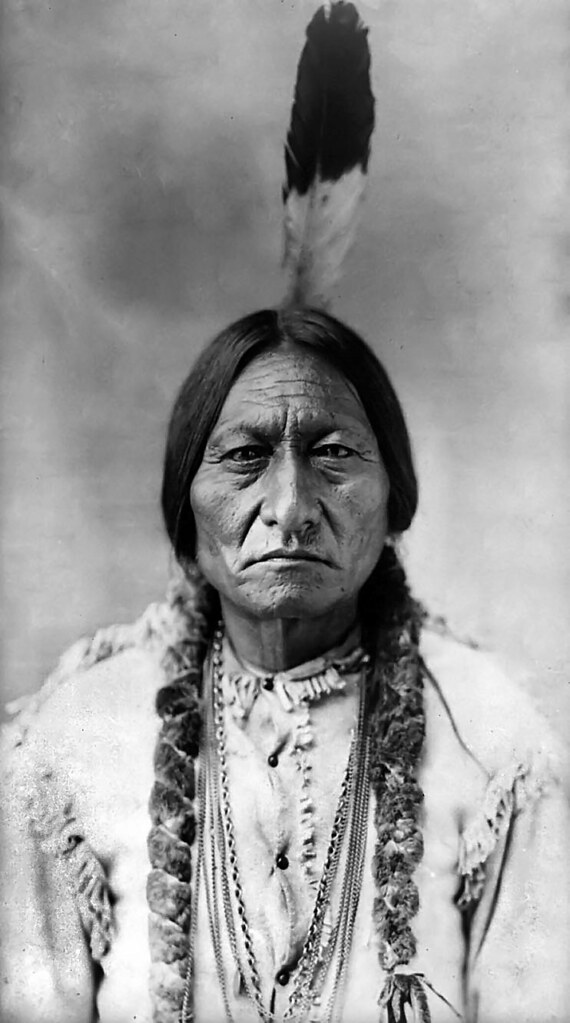
The Assassination of Robert Kennedy
U.S. Senator Robert F. Kennedy was assassinated in Los Angeles on June 5, 1968. The convicted assassin, 24-year-old Palestinian Sirhan B. Sirhan, attributed the killing to Kennedy's support for Israel during the Six-Day War. On March 3, 1969, in a Los Angeles, California court, Sirhan admitted that he had killed Kennedy. Sirhan has since recanted, and as late as 1998 has sought a new trial.
Sirhan fired a .22 caliber revolver eight times into the crowd surrounding Kennedy in the kitchen of the Ambassador Hotel shortly after Kennedy finished addressing supporters in the hotel's main ballroom. Sirhan was quickly detained at the scene by bystanders and then arrested. On March 3, 1969, in a Los Angeles, California court, Sirhan confessed that he had killed Kennedy, although he has maintained since he had been arrested that he had no memory of doing so.
Sirhan believed himself deliberately betrayed by Kennedy's support for Israel in the June 1967 Six-Day War, which had begun exactly one year before the assassination. He was among the first of Middle Eastern terrorists before the Iran Hostage Crisis and before Al-Qaeda came to prominence. After his arrest, Sirhan's journals and diaries were discovered, many entries obsessing over a desire to kill Kennedy. Sirhan later also claimed he acted unconsciously, possibly as the result of "hypnotic brainwashing".
Sirhan B. Sirhan
Sirhan B. Sirhan was Sitting Bull.
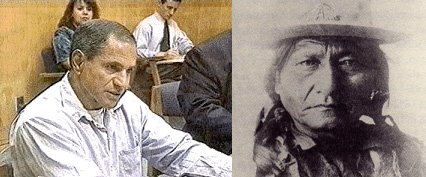
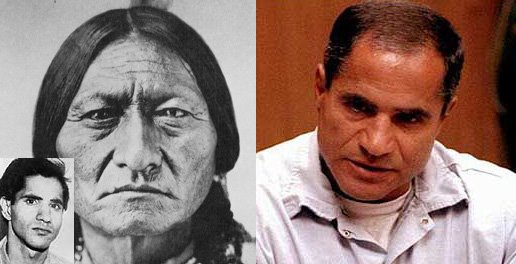
The End
Past Life Readings by Brianstalin
Sources
Most of the biographical data relating to famous living, dead or reincarnated persons was either copied directly from articles found at Wikipedia or slightly modified. It therefore remains free under the GNU Free Documentation License (GFDL).
Past life readings were supplied by trained expert Brianstalin who has studied with various gifted healers and teachers including the Dalai Lama.
Brianstalin reminds us that although the Akashic Records remains the ultimate source of all knowledge, we must access this source directly in order to determine the truth of what he or anybody is telling us.
© Copyright
Comparing photos of Joseph "Joe" Patrick Kennedy, Sr.(JFK's father) and Oswald I was struck by the similarity of facial features. Perhaps indicating some family connection in a recent past life or many past lives.

Oswald had obvious connections to Russia - he defected to the Soviet Union in October 1959 and married a Russian woman. It was logical then to look for the Kennedy family in Russia.
Nicholas I
According to the Akashic Records, Joseph "Joe" Patrick Kennedy, Sr. (JFK's father) was the reincarnation of Nicholas I of Russia.

Princess Charlotte of Prussia
Rose Fitzgerald Kennedy (JFK's mother) was the reincarnation of Princess Charlotte of Prussia (Nicholas I's wife).

Alexander II
Lee Harvey Oswald was the reincarnation of Alexander II, who was born the eldest son of Nicholas I of Russia and Charlotte of Prussia.
Alexander gave evidence of a kind disposition and a tender-heartedness which were considered out of place in one destined to become a military autocrat. Alexander succeeded to the throne upon the death of his father in 1855.
Alexander showed that, unlike his father, he meant to grapple boldly with the difficult and dangerous problem of serfdom. His deliberations at once raised a host of important, thorny questions. The emancipation was not merely a humanitarian question capable of being solved instantaneously by imperial decree. It contained very complicated problems, deeply affecting the economic, social and political future of the nation.

Marie Alexandrovna
Do you believe in the possibility of reincarnation? Oswald's Russian wife, Marina Prusakova is the reincarnation of Alexander II's wife - Princess Maximilienne Wilhelmine Marie of Hesse and the Rhine (also known as Marie Alexandrovna. The Mariinsky Theatre in Saint Petersburg is named after her).


The Assassination of Alexander II
There were numerous assassination attempts on Alexander II's life.
In March 1881 Alexander II fell victim to a Nihilist plot. While driving on one of the central streets of St. Petersburg, near the Winter Palace, he was mortally wounded by the explosion of hand-made grenades and died a few hours afterwards.


The Tsar was killed by the Pole Ignacy Hryniewiecki. Hryniewiecki was a Pole from Lithuania (Bobrujsk, now Babruysk, Belarus), where suppression and persecution of the Poles were the harshest. The Russians had instigated a complete ban on the Polish language in public places, schools, and offices in a process now known as Russification. In 1875 Hryniewiecki left for Saint Petersburg, where he joined the faculty of mathematics at the local Institute of Technology. Under influence from his teachers and colleagues he quickly got russified. Most probably this was the reason why he was invited to the meetings of Russian revolutionary Narodnaya Volya (People's Will) movement, unlike many of his colleagues of non-Russian descent.
In 1880, Hryniewiecki, Andrei Zhelyabov, Sophia Perovskaya and others were in charge of revolutionary propaganda among students and workers. He was one of the organizers of the "Worker's Gazette" and a type-setter for a clandestine printing-house.
On March 13, 1881 (Julian date: March 1), Hryniewiecki threw a bomb at the Tsar Alexander II, who was passing through Nevsky Prospekt near the Winter Palace. The Tsar was fatally wounded in the explosion and died a few hours afterwards. Hryniewiecki was mortally wounded at the scene as well. The attack may well have been a suicide bombing.
The assassination was aimed at igniting a social revolution. Its members - Nikolai Kibalchich, Sophia Perovskaya, Nikolai Rysakov, Timofei Mikhailov, Andrei Zhelyabov - were arrested and sentenced to death. Gesya Gelfman was sent to Siberia.

Who was Ignacy Hryniewiecki?

Alexander III of Russia
Alexander III reigned as Emperor of Russia from March 14, 1881 until his death in 1894.
Alexander was born at St. Petersburg, the second son of Tsar Alexander II by his wife Marie of Hesse-Darmstadt. In disposition, he bore little resemblance to his soft-hearted, liberal father.
During the first twenty years of his life, Alexander had little prospect of succeeding to the throne, because he had an elder brother, Nicholas, who seemed of robust constitution. Even when this elder brother first showed symptoms of delicate health, the notion that he might die young was never seriously entertained; Nicholas was betrothed to the charming princess Dagmar of Denmark. Under these circumstances, the greatest solicitude was devoted to the education of Nicholas as tsarevich, whereas Alexander received only the perfunctory and inadequate training of an ordinary grand-duke of that period, which did not go much beyond secondary instruction, practical acquaintance with French, English and German, and a certain amount of military drill.
Maria Feodorovna (Dagmar of Denmark)


Jack Ruby
Sophia Lvovna Perovskaya was a revolutionary, member of Narodnaya Volya (the People's Will).
Daughter of a former military governor of St.Petersburg, Perovskaya entered the Alarchinsky University for Women in 1869. In 1871—1872, together with other three women friends, she joined the Circle of Tchaikovsky. In 1872—1873 and 1874—1877, she worked in the provinces of Samara, Tver, and Simbirsk. During this period, she received diplomas as a teacher and a medical assistant.
In 1873, Perovskaya maintained a few conspiracy apartments in Saint Petersburg for secret anti-tsarist propaganda meetings that had not been sanctioned by the authorities. In January of 1874, she was arrested and placed in the Petropavlovskaya fortress in connection with the Trial of 193. In 1877-1878, she was acquitted. Perovskaya also took part in an unsuccessful attempt to free a revolutionary and a member of Narodnaya Volya Ippolit Myshkin. In summer of 1878, Perovskaya became a member of Zemlya i volya, was soon arrested again, and banished to the Olonetskaya province. She managed to escape on her way to the exile and went underground.
As a member of Zemlya i volya, Perovskaya went to Kharkov in order to organize the liberation of political prisoners from the central prison. In the fall of 1879, she became a member of the Executive Committee and later a member of the Administrative Committee of Zemlya i volya. Perovskaya conducted propaganda among students, soldiers, and workers, took part in organizing the Worker's Gazette, maintained ties with political prisoners in Saint Petersburg. Perovskaya participated in preparing assassination attempts on Alexander II of Russia near Moscow (November, 1879), in Odessa (spring of 1880), and Saint Petersburg (March 1, 1881). She was the closest friend and later wife of Andrei Zhelyabov. Perovskaya was arrested on March 10, 1881 and sentenced to death by hanging along with a few other Pervomartovtsi.
Sophia Perovskaya was the first woman in Russia executed in connection with a political trial.
Sophia Perovskaya later reincarnated as Jack Rubyand assassinated the reincarntion of the man she had plotted to kill in her previous life!

Assassination
Following Alexander II's death, Alexander III came to power. In 1887, once again Narodnaya Volya planned the murder of Tsar Alexander III. Among the conspirators captured were one Aleksandr Ulyanov. Ulyanov was sentenced to death and hanged on May 5, 1887. Alexander Ulyanov was the brother of Vladimir Ilyich Ulyanov, who would later take the pseudonym V.I. Lenin.
Sid Vicious
Alexander Ulyanov became John Simon Ritchie-Beverly, better known as Sid Vicious, who was an English punk rock musician and member of the band the Sex Pistols.
He died from a drug overdose at the age of 21.
Ulyanov and his comrades were preparing an assassination attempt on the life of Alexander III of Russia; however, on March 1, 1887 they were arrested. Ulyanov came forward with a political speech in court. On May 8, Alexander Ulyanov and his comrades Pakhomiy Andreyushkin, Vasili Generalov, Vasili Osipanov and Petr Shevyrev were sentenced to death and hanged.
The execution of his brother Alexander radicalized Lenin and he became more involved in student protests and revolutionary propaganda efforts.
Alexander Ulyanov's photo is on the left.

Edwin Walker
Lee Harvey Oswald put Walker under surveillance, taking pictures of the general's home and nearby railroad tracks (with the same camera Marina later used to take the famous backyard poses). Oswald mail-ordered a rifle using his alias Alex Hidell, having already mail-ordered a revolver in January. He planned the assassination for April 10, ten days after he was fired from Jaggars-Chiles-Stovall. He chose a Wednesday evening since the neighborhood would be relatively crowded because of services in a church adjacent to Walker's home: He would not stand out and could mingle with the crowds if necessary to make his escape. He left a note in Russian for Marina with instructions for her to follow should he be caught. Walker was sitting at a desk in his dining room when Oswald fired at him from less than a hundred feet (30 m) away. Walker survived only because the bullet struck the wooden frame of the window which deflected its path, but was injured in the forearm by bullet fragments.
The Dallas police had no idea who attempted to kill Walker. Marina saw Oswald burn most of his written assassination plans in the bathtub, although she hid the note he left her in a thick Russian book of household advice, intending to bring it to the police should Oswald again try to kill Walker or anyone else. Oswald's involvement was unknown until the note and some of the photos were found by authorities following the assassination of JFK. The bullet was too badly damaged to run conclusive ballistics studies, though neutron activation tests later proved the bullet was from the same cartridge manufacturer as the two which later struck Kennedy.
Maybe we can find Edwin Walker in Russia?
Dmitry Karakozov
In 1866 there was an attempt on the life of Alexander II (a former incarnation of Lee Harvey Oswald) in Petersburg by Dmitry Karakozov.
Stemming from a Kostroma family of petty nobility, Dmitry Karakozov studied at Kazan University (since 1861) and Moscow State University (since 1864). In the early 1866, he became a member of the "revolutionary wing" of the Ishutin Society, founded by his cousin Nikolai Ishutin in Moscow in 1863. In the spring of 1866, Karakozov arrived in St.Petersburg to assassinate Alexander II. He circulated his hand-written proclamation called "Друзьям-рабочим" (To Friends the Workers), in which he incited people to revolt. On April 4, 1866, Dmitry Karakozov made an unsuccessful attempt at shooting the emperor at the gates of the Summer Garden in St.Petersburg.
The Supreme Criminal Court sentenced Karakozov to death by hanging. He was executed in St.Petersburg on September 3, 1866.
To commemorate his narrow escape from death (that he referred to only as "the event of April 4, 1866") Alexander II held a competition to design a great gate for the city. Architect, painter and costume designer Viktor Hartmann won the competition. The design was well-received and Hartmann thought it was his finest work, but it would never be built. The painting of the design later became Mussorgsky's inspiration for The Great Gate of Kiev from Pictures at an Exhibition.
In the photo comparison above, Dmitry Karakozov is on the right.

The Kennedy Curse: George Armstrong Custer
On April 16, 1841 Alexander II married Maria Alexandrovna. The marriage produced six sons and two daughters. One son was Alexei Alexandrovich.
His Royal Highness, The Grand Duke Alexis Alexandrovitch Romanov of the Royal Romanov Family of the Great Empire of Russia. This was his official title. In late 1871 he made a trip of good will to the United States and visited in 34 major American cities. He gave $5000 ($250,000 today) in gold to the homeless people of Chicago after the great fire and liberal sums to others in the slums of Boston and New York. He became our adopted prince, just like princess Diana. He also became very popular with the ladies, and they made complete fools of themselves wherever he went. On his 22nd birthday, 14 January 1872, he was hunting buffalo on the plains of southwest Nebraska with American celebrities of the day, like Lt. General Sheridan, second in command of the US Army. General Custer, who became a fast friend and they continued to correspond by letter until the Battle of the Little Bighorn. Buffalo Bill, who loaned His Royal Highness his horse and his rifle and assisted him in bringing down a big buffalo bull. Chief Spotted Tail of the Brule (pronounced Brue-lay) who with some of his braves showed the Grand Duke how the Indians killed buffalo without using guns and who later became head chief of all the Sioux when Red Cloud was arrested after the Litle Bighorn. They also killed many champagne bottles on this hunt. Alexis spoke of the hunt many times during the rest of his life.
What's the connection to Robert Kennedy?
Robert Kennedy appears in my story as Tsar Paul I of Russia (father of Nicholas I - see the beginning of my story) and George Armstrong Custer.



Paul was born in the Summer Palace at St Petersburg. He was the son of the Grand Duchess, afterwards Empress, Catherine (The Great). According to some, his father was not her husband, the Grand Duke Peter, afterwards emperor, but Catherine's lover Sergei Saltykov. Although Catherine herself hinted that the story was true, it is fairly likely that this was simply an attempt to cast doubt on Paul's right to the throne, in order to prop up Catherine's own somewhat shaky claim. During his infancy Paul was taken from the care of his mother by the Empress Elizabeth, whose ill-judged fondness allegedly injured his health. As a boy he was reported to be intelligent and good-looking. His pugnacious facial features in later life are attributed to an attack of typhus, from which he suffered in 1771. It has been asserted that his mother hated him, and was only restrained from putting him to death while he was still a boy by the fear of what the consequences of another palace crime might be to herself. Her dissolute court provided a bad home for a boy destined to become the sovereign, but Catherine took great trouble to arrange his first marriage with Wilhelmina of Hesse-Darmstadt (who acquired the Russian name "Natalia Alexeievna") in 1773. After his first marriage Tsar Paul I became involved in intrigues. He believed he was the target of assassination. When his wife died in childbirth in 1775, his mother arranged another marriage on October 7, 1776, with the beautiful Sophia Dorothea of Württemberg, renamed in Russian "Maria Feodorovna".
Maria bore Paul 10 children. Tsar Paul grew to hate her.
Sophia Dorothea of Württemberg later became Marilyn Monroe.

Robert Kennedy
Why was Robert Kennedy assassinated?
Was it connected to events in Russia, the Battle of the Little Bighorn or both?
In 1875, Custer swore by White Buffalo Calf Pipe, a pipe sacred to the Lakota, that he would not fight Indians again. "He who swears by the pipe and breaks oaths, comes to destruction, and his whole family dies, or sickness comes upon them."
Sitting Bull
Sitting Bull was a Native American clergyman and leader of the Hunkpapa Sioux, who led 3,500 Sioux and Cheyenne warriors against the US 7th Cavalry under George Armstrong Custer at the Battle of Little Bighorn on June 25, 1876. Though he did not participate personally in the battle, the chiefs were spurred on by a dream that Sitting Bull had in which a group of American soldiers tumbled into his encampment.
Blamed for the ensuing massacre, Sitting Bull led his tribe into Canada, where they lived until 1881, when on July 20 he led the last of his fugitive people in surrender to United States troops at Fort Buford in Montana. The US government, however, had granted him amnesty.
In later life, Sitting Bull toured with Buffalo Bill Cody's Wild West Show, where he was a popular attraction. Often asked to address the audience, he frequently cursed them in his native Lakota language to the wild applause of his listeners.
Toward the end of his life, Sitting Bull was drawn to the mystical Ghost Dance as a way of repelling the white invaders from his people's land. Although he himself was not a follower, this was perceived as a threat by the American government, and a group of Indian police was sent to arrest him. In the ensuing scuffle, Sitting Bull and his son Crow Foot were killed.

The Assassination of Robert Kennedy
U.S. Senator Robert F. Kennedy was assassinated in Los Angeles on June 5, 1968. The convicted assassin, 24-year-old Palestinian Sirhan B. Sirhan, attributed the killing to Kennedy's support for Israel during the Six-Day War. On March 3, 1969, in a Los Angeles, California court, Sirhan admitted that he had killed Kennedy. Sirhan has since recanted, and as late as 1998 has sought a new trial.
Sirhan fired a .22 caliber revolver eight times into the crowd surrounding Kennedy in the kitchen of the Ambassador Hotel shortly after Kennedy finished addressing supporters in the hotel's main ballroom. Sirhan was quickly detained at the scene by bystanders and then arrested. On March 3, 1969, in a Los Angeles, California court, Sirhan confessed that he had killed Kennedy, although he has maintained since he had been arrested that he had no memory of doing so.
Sirhan believed himself deliberately betrayed by Kennedy's support for Israel in the June 1967 Six-Day War, which had begun exactly one year before the assassination. He was among the first of Middle Eastern terrorists before the Iran Hostage Crisis and before Al-Qaeda came to prominence. After his arrest, Sirhan's journals and diaries were discovered, many entries obsessing over a desire to kill Kennedy. Sirhan later also claimed he acted unconsciously, possibly as the result of "hypnotic brainwashing".
Sirhan B. Sirhan


The End
Past Life Readings by Brianstalin
Sources
Most of the biographical data relating to famous living, dead or reincarnated persons was either copied directly from articles found at Wikipedia or slightly modified. It therefore remains free under the GNU Free Documentation License (GFDL).
Past life readings were supplied by trained expert Brianstalin who has studied with various gifted healers and teachers including the Dalai Lama.
Brianstalin reminds us that although the Akashic Records remains the ultimate source of all knowledge, we must access this source directly in order to determine the truth of what he or anybody is telling us.
© Copyright
All images contained on this website are copyrighted property of their respective owners. All rights are reserved.
